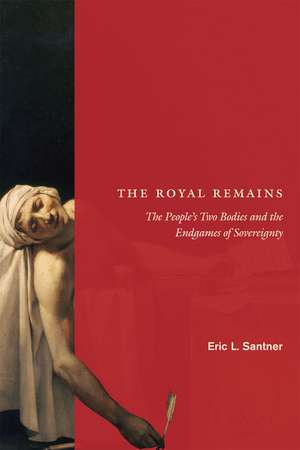The Royal Remains: The People's Two Bodies and the Endgames of Sovereignty
Autor Professor Eric L. Santneren Limba Engleză Paperback – 15 mai 2011
"The king is dead. Long live the king!" In early modern Europe, the king's body was literally sovereign—and the right to rule was immediately transferrable to the next monarch in line upon the king's death. In The Royal Remains, Eric L. Santner argues that the "carnal" dimension of the structures and dynamics of sovereignty hasn't disappeared from politics. Instead, it migrated to a new location—the life of the people—where something royal continues to linger in the way we obsessively track and measure the vicissitudes of our flesh.
Santner demonstrates the ways in which democratic societies have continued many of the rituals and practices associated with kingship in displaced, distorted, and usually, unrecognizable forms. He proposes that those strange mental activities Freud first lumped under the category of the unconscious—which often manifest themselves in peculiar physical ways—are really the uncanny second life of these "royal remains," now animated in the body politic of modern neurotic subjects. Pairing Freud with Kafka, Carl Schmitt with Hugo von Hofmannsthal,and Ernst Kantorowicz with Rainer Maria Rilke, Santner generates brilliant readings of multiple texts and traditions of thought en route to reconsidering the sovereign imaginary. Ultimately, The Royal Remains locates much of modernity—from biopolitical controversies to modernist literary experiments—in this transition from subjecthood to secular citizenship.
This major new work will make a bold and original contribution to discussions of politics, psychoanalysis, and modern art and literature.
Santner demonstrates the ways in which democratic societies have continued many of the rituals and practices associated with kingship in displaced, distorted, and usually, unrecognizable forms. He proposes that those strange mental activities Freud first lumped under the category of the unconscious—which often manifest themselves in peculiar physical ways—are really the uncanny second life of these "royal remains," now animated in the body politic of modern neurotic subjects. Pairing Freud with Kafka, Carl Schmitt with Hugo von Hofmannsthal,and Ernst Kantorowicz with Rainer Maria Rilke, Santner generates brilliant readings of multiple texts and traditions of thought en route to reconsidering the sovereign imaginary. Ultimately, The Royal Remains locates much of modernity—from biopolitical controversies to modernist literary experiments—in this transition from subjecthood to secular citizenship.
This major new work will make a bold and original contribution to discussions of politics, psychoanalysis, and modern art and literature.
Preț: 262.29 lei
Nou
Puncte Express: 393
Preț estimativ în valută:
50.20€ • 51.85$ • 41.78£
50.20€ • 51.85$ • 41.78£
Carte tipărită la comandă
Livrare economică 25 martie-08 aprilie
Preluare comenzi: 021 569.72.76
Specificații
ISBN-13: 9780226735368
ISBN-10: 0226735362
Pagini: 288
Ilustrații: 1 halftone
Dimensiuni: 152 x 229 x 15 mm
Greutate: 0.4 kg
Editura: University of Chicago Press
Colecția University of Chicago Press
ISBN-10: 0226735362
Pagini: 288
Ilustrații: 1 halftone
Dimensiuni: 152 x 229 x 15 mm
Greutate: 0.4 kg
Editura: University of Chicago Press
Colecția University of Chicago Press
Notă biografică
Eric L. Santner is the Philip and Ida Romberg Professor in Modern Germanic Studies, professor of Germanic studies, and a member of the Center for Jewish Studies at the University of Chicago. He is the author of several books, most recently On Creaturely Life: Rilke, Benjamin, Sebald, also published by the University of Chicago Press.
Cuprins
Preface
Acknowledgments
PART ONE
Acknowledgments
PART ONE
1 Sovereignty and the Vital Sphere
2 Of Kings and Other Creatures
3 Toward a Science of the Flesh
PART TWO
4 Was heisst Schauen? On the Vital Signs of Visual Modernism
5 The Stages of the Flesh: Shakespeare, Schmitt, Hofmannsthal
6 The Poet’s Two Bodies: Rainer Maria Rilke’s The Notebooks of Malte Laurids Brigge
Epilogue
Index
